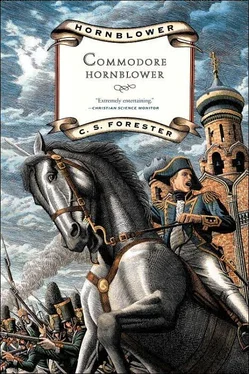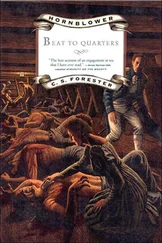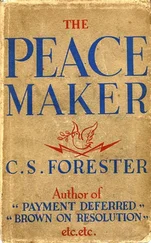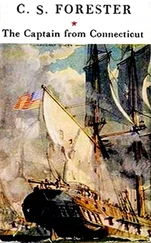“I would do so if I could,” said Hornblower, “but at the present moment I can see no means of getting my guns into range.”
Clausewitz looked at him coldly, and Hornblower was conscious that goodwill between allies was a frail thing. Earlier that morning British and Russians had been the best of friends; Essen and Clausewitz had been thoroughly elated at the turning back of Macdonald’s attempt to cross the river, and—like the unthinking junior officers in the squadron—had thought that the annihilation of a half-battalion of Prussians a notable success, not knowing of the far more far-reaching plan which Hornblower had made and which Cole’s nervousness had brought to almost naught. When affairs went well, allies were the best of friends, but in adversity each naturally tended to blame the other. Now that the French approaches were moving towards Daugavgriva he was asking why the Russian artillery did not stop them, and the Russians were asking why his ships’ guns did not do the same.
Hornblower made his explanation as fully as he could, but Clausewitz turned an unsympathetic ear, and so did Essen when the matter came up for discussion as Hornblower was saying goodbye to him. It was a poor showing for a Navy whose boast was that nothing was impossible; Hornblower was irritable and snappy when he returned that afternoon to the Nonsuch, and he had no word for Bush who came hastily to greet him as he came up the side. His cabin was unfriendly and inhospitable to his jaundiced eye when he entered it, and it was ‘make and mend’ day on board, with the hands skylarking noisily on the deck, so that he knew that if he went up to walk the quarter-deck his train of thought would be continually interrupted. He toyed for a moment with the idea of ordering Bush to cancel his order to make and mend and instead to put the hands to some quiet labour. Everyone would know that it was because the Commodore wanted to walk the deck in peace, and might be properly impressed with his importance, but there was never a chance of his acting on the notion. He would not deprive the men of their holiday, and the thought of swelling his importance in their eyes acted as a positive deterrent.
Instead, he went out into the quarter gallery, and, bowed below the overhanging cove above, he tried to stride up and down its twelve-foot length. It was indeed a pity that he could not bring his ships’ guns to bear on the siege-works. Heavy guns at close range would play havoc with the French breastworks. And behind the high dyke from which he had seen the guns being dragged must lie the French park and train—a few shells from the bomb-vessels would wreak havoc there, and if only he could get the ketches up the bay it would be easy to drop shells over the dyke. But over most of the bay there was only three or four feet of water, and nowhere more than seven. The thing was impossible, and the best thing he could do was to forget about it. To distract himself he stepped over the rail into the other quarter gallery, and peeped through the stern window into Bush’s cabin. Bush was asleep on his cot, flat on his back with his mouth open, his hands spread wide at his sides and his wooden leg hanging in a becket against the bulkhead. Hornblower felt a twinge of annoyance that his captain should be sleeping so peacefully while he himself had so many cares on his shoulders. For two pins he would send a message in to Bush and wreck his nap for him. But he knew he would never do that, either. He could never bring himself to a wanton abuse of power.
He stepped back into his own quarter gallery, and as he did, as he stood with one leg suspended and with the rudder gudgeons creaking a little in their pintles in the stream below him, the idea came to him, so that he stood stock still for a space, with one leg in mid-air. Then he brought his leg over and walked into his cabin and shouted for a messenger.
“My compliments to the officer of the watch, and will he please signal to Harvey for Mr. Mound to come on board at once.”
Mound came down into the cabin, young and expectant, and yet with his eagerness thinly overlaid with assumed nonchalance. It suddenly dawned upon Hornblower as he greeted him that that careless lackadaisical air of Mound’s was assumed in imitation of himself. Hornblower realized that he was something of a hero—more than that, very much of a hero—to this young lieutenant who was paying him the sincerest flattery of imitation. It made him grin wryly to himself even while he motioned Mound to a chair, and then it was forgotten as he plunged into the vital discussion.
“Mr. Mound, do you know of the progress of the French siege-works?”
“No, sir.”
“Then look at this chart with me. They have a line of trenches here, with a battery here. Their main flank and stores are behind a dyke, here. If we could bring the bomb-vessels up the bay we could shell them out of both places.”
“Shoal water, sir,” said Mound regretfully.
“Yes,” said Hornblower, and for the life of him he could not stop himself from making a dramatic pause before uttering the crucial word. “But with camels we could reduce the draught.”
“Camels!” exclaimed Mound, and as he realized all the implications his face lit up. “By George, sir, you’re right.”
Camels are a means of reducing the draught of a ship—loaded vessels lashed tightly one on each side and then emptied, so as to raise the centre ship farther out of the water. Mound was already grappling with the details.
“There are lighters and barges in Riga, sir. They’ll give us some, sure as a gun. Plenty of sand to ballast ‘em, or we can fill ‘em with water and pump ‘em out. With two big lighters I could lessen Harvey ’s draught by five feet easy—lift her clear out of the water for that matter. Those lighters are two hundred tons burden an’ don’t draw more than a couple of feet empty.”
A difficulty had occurred to Hornblower while Mound was speaking, one which he had not thought of before.
“How are you going to steer ‘em all?” he demanded. “They’ll be unmanageable.”
“Rig a Danube rudder, sir,” replied Mound instantly. “Make it big enough and you could steer anything with one.”
“’Give me a fulcrum and I will move the world’,” quoted Hornblower.
“Exactly, sir. An’ I’ll pierce the lighters for sweeps, There’ll be no beatin’ to wind’ward any more than in a raft. I could put the men to work at once if you’ll give the order, sir.”
Mound might have been a boy of ten instead of one of twenty from the eagerness of his voice. The languid calm was quite forgotten.
“I’ll send a note to the Governor,” said Hornblower, “asking for the loan of four lighters. I’ll make it six, in case of accidents. Have your plans ready in an hour’s time. You can draw upon this ship and the sloops for the materials and men you’ll need.”
“Aye aye, sir.”
There was need for haste, for that very evening there came sullenly booming across the bay the sound of heavy guns firing, not the higher-pitched incisive growl of the field-pieces they had heard before, but the deep-toned roar of siege artillery; the enemy was trying a few shots with the first of the big guns dragged up into their battery. And the next morning, just as Hornblower came out on the quarter-deck, there was a sudden loud crash ashore, like a peal of thunder, to herald the opening salvo of the enemy. Its echoes had not died away before a more ragged salvo succeeded it, and then another more ragged still, and so on until the air was ceaselessly tormented by the loud reports, like a continuous thunderstorm from which the ear waited continually for relief that was not granted it. The masthead lookout reported a long smear of smoke drifted by the breeze across the countryside from the enemy’s battery.
Читать дальше












